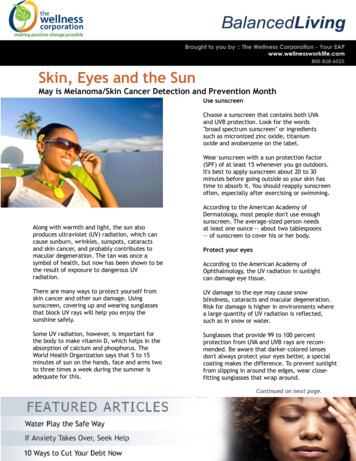
Transcription
Skin, Eyes and the SunMay is Melanoma/Skin Cancer Detection and Prevention MonthUse sunscreenChoose a sunscreen that contains both UVAand UVB protection. Look for the words"broad spectrum sunscreen" or ingredientssuch as micronized zinc oxide, titaniumoxide and avobenzene on the label.Wear sunscreen with a sun protection factor(SPF) of at least 15 whenever you go outdoors.It's best to apply sunscreen about 20 to 30minutes before going outside so your skin hastime to absorb it. You should reapply sunscreenoften, especially after exercising or swimming.Along with warmth and light, the sun alsoproduces ultraviolet (UV) radiation, which cancause sunburn, wrinkles, sunspots, cataractsand skin cancer, and probably contributes tomacular degeneration. The tan was once asymbol of health, but now has been shown to bethe result of exposure to dangerous UVradiation.According to the American Academy ofDermatology, most people don't use enoughsunscreen. The average-sized person needsat least one ounce -- about two tablespoons-- of sunscreen to cover his or her body.Protect your eyesAccording to the American Academy ofOphthalmology, the UV radiation in sunlightcan damage eye tissue.There are many ways to protect yourself fromskin cancer and other sun damage. Usingsunscreen, covering up and wearing sunglassesthat block UV rays will help you enjoy thesunshine safely.UV damage to the eye may cause snowblindness, cataracts and macular degeneration.Risk for damage is higher in environments wherea large quantity of UV radiation is reflected,such as in snow or water.Some UV radiation, however, is important forthe body to make vitamin D, which helps in theabsorption of calcium and phosphorus. TheWorld Health Organization says that 5 to 15minutes of sun on the hands, face and arms twoto three times a week during the summer isadequate for this.Sunglasses that provide 99 to 100 percentprotection from UVA and UVB rays are recommended. Be aware that darker-colored lensesdon't always protect your eyes better, a specialcoating makes the difference. To prevent sunlightfrom slipping in around the edges, wear closefitting sunglasses that wrap around.Continued on next page.
Continued from previous page.Studies show the sun exposure is greater whenit's reflected by water, snow or concrete, so usesunscreen and wear sunglasses even whilesitting under an umbrella.Cover upHere are more guidelines to protect your skin: Wear a hat with a brim that's at leastfour inches wide. Baseball caps don'tprotect your ears or neck. Wear protective clothing that coversyour neck, arms and legs. Fabrics with atight weave help block sunlight. Limit the amount of time you spend inthe sun between 10 a.m. and 3 p.m.Krames StaywellFor more information:www.melanomamonday.orgWater Play the Safe WayThe most important rule for having safe fun inthe water is "know how to swim." Lessons from aqualified instructor give your children the skillsthey need to help stay safe in the water. Callyour local American Red Cross chapter or YMCAto ask about -----------Pool Safety Rules Obey all posted rules. Dive only where diving is allowed.Dive only where the water is morethan nine feet deep and you have atleast 25 feet of clear water ahead. Ifyou don't know the depth, gentlyenter the water feet first; if youfeet don't touch the bottom, swimdown to determine the depth. Never jump on someone or pushsomeone into the pool. Never pretend someone is drowning.That can slow the time it takes toget help in an emergency. Obey the lifeguard. He or she isthere to keep you safe.River and Lake Safety Rules Swim only where swimming isLearning how to swim does not guarantee thataccidents won't happen. So be sure you and yourfamily observe the following rules.General Safety Rules Always swim with a buddy.Never drink alcohol before swimming.Don't swim in stormy weather.Don't chew gum in the water.Never swim in the dark. allowed and where you are familiarwith the water currents and depth.Don't swim where there is a strongcurrent. Currents can carry awayeven the best swimmers.Know your limits. Don't let otherspersuade you to do things you arenot comfortable doing.Don't dive into the water if you don'tknow how deep it is.Stay away from areas that arereserved for boats.Continued on next page.May 20122
Continued from previous page.Ocean Safety Rules Obey all posted rules. Learn what warning flags on the beachmean. Don't go into the water if a flagshows it is unsafe. If you get caught in a current, swimacross it, not against it. Follow a lifeguard's rules about how faryou can swim from shore.Special Tips for Parents Watch children at all times when theyare near water -- even in a wading pool. At pool parties, have adults take turns watching the children. That way, you willalways know that someone is watching thekids.If you have a pool, enclose it with a fenceand a locked gate. (The law requires this inmany states.) Remove toys from the area sothat kids aren't tempted to go near thepool. Hang signs with rules, such as "Noplaying in or around the pool unless anadult is present." Enforce the rules.Make sure baby-sitters know the safetyrules about swimming.Take a cardiopulmonary resuscitation(CPR) class.Check with your local American RedCross chapter or YMCA about special lifejackets for infants and children.Not so long ago, anxiety disorders didn't evenhave names. Some people ask if there's muchto them, or whether doctors and drugcompanies have just put labels on feelingspeople have always had.Yes, people have always had them, says KamiWhite, Ph.D., director of behavioral medicineat Boston University's Center for Anxiety andRelated Disorders. But for a long time, no oneknew those feelings could cross the line tobecome severe ailments that need treatment,says Dr. White. "The old adage was 'Oh, shejust has a case of nerves.'" The result: a greatdeal of needless torment.Krames StaywellChronic and relentlessIf Anxiety Takes Over, Seek HelpIf you open your front door and a tiger leaps atyou, it's normal to be afraid. But if you open thatdoor and find no tiger -- and you're still afraid -that's an anxiety disorder.Do you fear the tiger, or do you fear the fear?That's a key question with anxiety disorders, saysWandal Winn, M.D., of Anchorage, Alaska, a publicaffairs representative for the American PsychiatricAssociation.May 2012Anxiety disorders plague an estimated 19million U.S. residents, says the NationalInstitute of Mental Health (NIMH). Theseserious illnesses, "fill people's lives withoverwhelming anxiety and fear. Unlike therelatively mild, brief anxiety caused by astressful event such as a business presentationor a first date, anxiety disorders are chronic,relentless, and can grow progressively worse ifnot treated," the NIMH says.Continued on next page.3
Continued from previous page.But the line between a shy guy and one with socialanxiety disorder can be thin. These conditions canbe misdiagnosed, over-diagnosed or wrongly selfdiagnosed. That's especially true as drugcompanies promote a stream of medications totreat depression, anxiety and stress.According to NIMH, symptoms of a general anxietydisorder (GAD) include constant, exaggeratedworrisome thoughts and tension about everydayroutine life events and activities, lasting at leastsix months. A person with GAD always anticipatesthe worst even though there is little reason toexpect it. Other symptoms include fatigue,trembling, muscle tension, headache or nausea."There is more and more pressure to deal with thisat the primary physician's office, someone otherthan a mental health professional," says clinicalpsychologist Rudy Nydegger, Ph.D., a psychologyprofessor at Union College in Schenectady, N.Y."There's a tendency to diagnose quickly andprescribe quickly when the patient clearly is indistress."But Dr. Nydegger says, "Medication alone simplyalleviates some of the troubling symptoms.Medication alone doesn't deal with significantcauses or underlying causes."See your doctor firstThat's not to say someone with anxiety symptomsshouldn't first see the family doctor. Based on apatient's medical history and an exam, the doctorcan often tell that what the patient is goingthrough has a physical rather than psychologicalcause, or that it's a one-time thing.Medication may ease a panic attack, but it's notgoing to get someone with social anxiety disorder"back to the picnic," Dr. White says. "Ultimately,it's up to a doctor or a psychologist to get peopleback into the social world they've left."May 2012"Not everybody that has anxiety needs to be onmedication," Dr. Winn says. "In my practice, itmay be approaching 50-50." He says he's waryof medications because they can causepsychological or physical addictions or sideeffects - including anxiety.Several types of "talk therapy" can treatanxiety disorders."Medication isn't the first thing that comes tomy mind when I'm helping that person," Dr.Winn says. "The first thing is education.Anxiety tends to feed in the dark. If a personknows what he really has, that is a verypowerful antidote."Krames Staywell10 Ways to Cut Your Debt NowFor many, the decision to get out of debt ispreceded by weeks, months or possiblyyears of worry about these obligations. Butit's important to know that getting rid ofdebt can actually start with some very smallsteps and strategies that you can begintoday.Advice is a good first step. A meeting with aprofessional financial planner can help youinvestigate all sources of income and totalup all your obligations – most will make youbring all your bills with you – and tailor aplan that matches your needs andcircumstances. But in general terms, hereare 10 steps you should follow:1. Get a grip on the amount of debt youhave: You can't overcome a debt problemwithout knowing how much you owe.Continued on next page.4
Continued from previous page.Start pulling together every bill with a balancewhere you're charged non-tax-deductibleinterest – credit cards, auto loans for a start –and get a total. If you've missed any paymentson any of these balances, bring those currentfirst. Then organize the rest of the debt alonginterest rates and set a payment order thatattacks your highest rate balances first. Also,this is a good time to check your credit reportsto make sure there are no other surprises inyour credit picture. For the three credit reportsyou are entitled to for free each year, go to thissite: www.annualcreditreport.com. Any othercredit report with the word "free" in its namethat asks for a credit card number will likelycharge you – avoid those.4. Try to refinance your home debt: If youhave not recently refinanced your mortgageor home equity debt, see if there's anopportunity to do so while rates are stilllow. You'll need at least 10 percent equity inyour home and a credit score exceeding 740to qualify for the best rates, but startnegotiating with your current lender firstand see how well you do.2. Put the credit cards away: Cut up your cardsif you have to, but at the very least, put themin a safe place where they're far away from yourwallet and your phone or computer (so you don'tuse them for catalog or web orders). Once yourdebt is paid off, then you can consider whichaccounts you will use – sparingly – in the future.(Hint: The cards with the lowest rates.)3. Now get a grip on spending: It's time tomake a budget. For a month, start tracking yourspending – every dime. You can do this on paperor on a computer-based solution like Quicken orMint.com. As you go through the numbersweekly, start identifying things you can livewithout – coffee and doughnuts, expensivelunches (carryout is a huge budget-buster) andany other frills that can be cut or eliminated.Once you start to suspect that a particularspending item isn't absolutely essential, cutthem immediately – don't wait for the end ofthe month. When you get to the end of themonth, build a spending plan that covers theessentials, a few small treats and then directsany additional savings you've identified towardpaying off the debt.5. Try to refinance your credit carddebt: If you are facing an overwhelmingamount of credit card debt, talk to eachcredit card company directly to see if youcan lower rates or monthly paymentamounts. Don't fall for the 2 a.m. come-onsfrom debt resolution companies – theygenerally charge high fees and take thepayment process out of your hands, whichmay mean late or missed payments. It's noteasy to negotiate a better deal and you mayneed to insist to speak with severalsupervisors. But if you succeed at getting amore favorable deal, it's better if you keepthe payment process in your hands so youcan keep a constant eye on how yoursituation is improving.Continued on next page.May 20125
Continued from previous page.6. If you need outside help, use somesmarts: The provisions of the new Credit CardAccountability, Responsibility and Disclosure Actthat took effect in February 2010 require thatcredit card issuers print a toll-free number for anonprofit credit counseling service on every bill.It's important to know that the credit cardcompanies fund these nonprofits, so they're notacting completely in your interest. Nor are theyfoolproof in making sure bills get paid on time –any time you let someone else handle yourfinances you face that risk. But if you arelooking for outside assistance and negotiationwith your balances, these agencies are a betteroption than those credit-repair agencies you'llsee advertised on TV. Yet a financial plannermay be able to offer specific negotiation tipsthat can help you keep better control of yourdebt issues.7. Learn to use cash or debit: Try to migrate asmuch spending as you can to cash as long as youget receipts that help you track that spending. Amore efficient solution – particularly if youdownload your bank transactions into a financialtracking computer program – is the debit card.Debit cards wearing a bankcard logo aretypically welcome at most stores where creditcards are accepted. This way, you pay cashwithout carrying cash. If you don't have such acard, you can probably get one from your bankto replace your traditional ATM card, butremember to tell them to limit your buyingpower on the card to only what you have in youraccount. Then keep a close watch on spendingso you don't overdraw.do-it-yourself a necessity. See if that optionis right for you and you might saveconsiderable money doing it. Also, forbigger jobs, pair up with friends and familyand you can help each other save money.9. Plan your shopping in advance: Impulsebuying had its own role in the debt crisis.It's time to stamp it out at least until yourdebt issues are fully under control. Startmaking a centralized list of necessaryshopping items – keep the list for grocery,discount store and other locations on onepage if you can so you can see everythingyou're considering. Mark off what seems lessthan necessary. And use coupons and otherdiscounts – the same goes for onlinepurchases. Always do a search for couponand discount codes to save money onshipping and overall purchase price. Oh, andwhen you can, buy used – recycled clothes,furniture and home goods will save youmoney, and if you're making smartpurchases, no one will care. Again, direct allsavings toward debt.10. At the end of the rainbow, don'trestart the problem: Once the slate isclean, don't start spending again. Startsaving and investing.Financial Planning Association (FPA )8. If you can do it safely, DIY: You don't have topay for a hand car wash or a lawn service if youcan do such things yourself. For any home orauto maintenance chores you may have duringthe year, learn as much as you can about thosetasks and how much skill, money and time ittakes to do them. Previous generations madeMay 20126
Check with your local American Red Cross chapter or YMCA about special life jackets for infants and children. Krames Staywell If Anxiety Takes Over, Seek Help If you open your front door and a tiger leaps at you, it's normal to be afraid. But if you open that door and find no tiger











